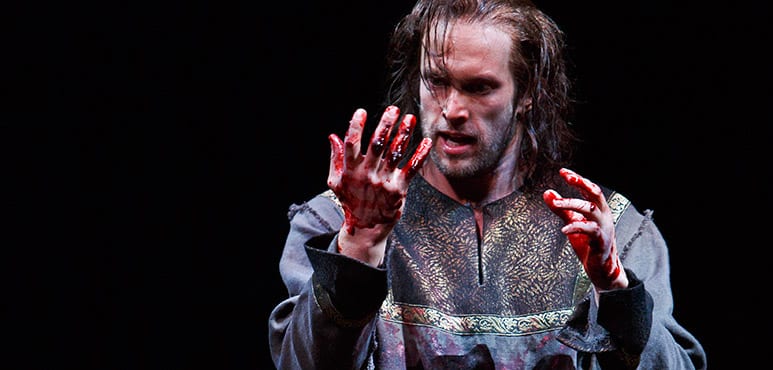As the lights went down in the Festival Theater, expectations were high. The venue was packed to capacity as this Canadian summer ritual enfolded. The play, on the other hand, was anything but summery, as we were soon transported to Antoni Cimolino’s fierce, rugged medieval Scotland, to witness the descent of one man, his love, his people, and his world, into madness.
Shakepeare’s Macbeth is, arguably, a perfect tragedy. It’s a play that is hard to mess up, as it moves from horror to horror, exploring the depths of human folly as one man unseams himself from all that is right and moral in this world. Macbeth’s descent into darkness is entirely of his own making, witches and omens that spell his meteoric rise and fall being only harbingers of his own dark soul’s intent. Macbeth is also a quintessentially modern play for these very reasons. This man’s preoccupation is not with God, or his place within the cosmos, but finally and most materially with himself. These thematics, so present in Shakespeare’s play, were somewhat diminished in this performance.
What is deeply satisfying about Cimolino’s approach to Shakespeare is his powerful command of tradition. One has the sense of being transported from the present day into the Elizabethan theatre. In Cimolino’s hands, Shakepeare’s plays speak with the power they have commanded through the ages precisely because he does not resort to outlandish gimmicks to manufacture drama. This method was seen to splendid effect in King Lear in 2014, where a veteran lead and impeccable ensemble delivered a performance of rare perfection. This year’s Macbeth follows the same approach, but sadly could not command the same response, largely because many of the performances on stage, while being perfectly adequate, produced no electricity or magic.
But this was certainly not the case among the three weird sisters played by Deidre Gillard-Rowlings, Lanise Antoine Shelley and Brigit Wilson. Their profoundly unsettling physical theatre and tripled voicings were enough to make any person’s hair stand on end. Likewise in their projected power were Lady Macduff and Macduff, played by Sarah Afful and Michael Blake–their courage and agony bringing tears of rage and horror to many in the audience. Krystin Pellerin, as Lady Macbeth, delivered a performance that built steadily to the gut wrenching scream with which she sealed her descent into madness in the sleep-walking scene. But sadly, Ian Lake in the title role was disappointing, largely because his delivery was wooden and his timing leaden. When Lady Macbeth’s death was announced, the house was treated to an almost Elizabethan moment when an audience member blurted out “Oh my god!” reducing the rest of the audience to giggles. Rather than waiting a decent interval, Mr. Banks soldiered on with his “Tomorrow, and tomorrow, and tomorrow” soliloquy through muffled titters.
Still, this is a thoroughly enjoyable performance, and one that any Shakespeare buff must see. And the charm of Stratford is that as a repertory theater, audience members can binge on Shakespeare, new adaptations, classics and musicals, all in one lovely summer’s day. On speaking to audience members in the lobby, there were many who praised this production of Macbeth for its fidelity, and others who were less enchanted by the performances delivered, but all agreed that Stratford still gives us the best Shakespeare to be had anywhere in North America. The reason we have grown to desire so much from this festival is because it unfailingly delivers all.

